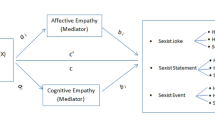Abstract
This study investigated the role of humor, gender, and sexist attitudes toward women in the interpretation of sexist incidents. Thirty female and thirty male university students rated the humorousness of and the reactions to recent sexist incidents on Canadian university campuses. As predicted, perceiving sexist incidents as humorous was associated with the tendency to see them as less sexist, to understand the actions and attitudes displayed as more acceptable, and to believe one would have shown approval of the latter. Path analysis indicated that gender did not affect the interpretations of and reactions to these incidents, and that the influence of sexist attitudes toward women was mainly indirect—that is, via their impact on the perception of humorousness.
Similar content being viewed by others
References
Adams, K. L., & Ware, N. C. (1984). Sexism and the English language: The linguistic implications of being a woman. In J. Freeman (Ed.),Women: A feminist perspective. Mountain View, CA: Mayfield.
Bem, S. (1975). Sex-role adaptability: One consequence of psychological androgyny.Journal of Personality and Social Psychology, 31, 634–643.
Benson, P., & Vincent, S. (1980). Development and validation of the sexist attitudes towards women scale (SATWS).Psychology of Women Quarterly, 5, 276–291.
Bird, C. (1968). On being born female.Vital Speeches of the Day, 35, 88–91.
Blau, F. (1986).The economics of women, men and work. Englewood Cliffs, NJ: Prentice-Hall.
Bleier, R. (1984).Science and gender: A critique of biology and its theories on women. New York: Pergamon Press.
Brodzinsky, D. M., Barnet, K., & Aiello, J. R. (1981). Sex of subject and gender identity as factors in humor appreciation.Sex Roles, 7, 561–573.
Buhrke, R. A. (1988). Factor dimensions across different measures of sex role ideology.Sex Roles, 18, 309–321.
Cantor J. R. (1976). What is funny to whom? The role of gender.Journal of Communication, 26, 164–172.
Chapman, A. J. (1976). Is sexual humor sexist.Journal of Communication, 26, 141–153.
Chavez, D. (1985). Perpetuation of gender inequality: a content analysis of comic strips.Sex Roles, 13, 93–102.
Coser, R. L. (1960). Laughter among colleagues. A study of the social functions of humor among the staff of a mental hospital.Psychiatry, 23, 81–91.
Crowne, D., & Marlow, D. (1964).The approval motive: studies in evaluative dependence. New York: Wiley.
Daly, M. (1973).Beyond God the father: Towards a philosophy of women’s liberation. Boston: Beacon Press.
De Crow, K. (1975).Sexist justice. New York: Vintage Press.
Frazier, N., & Sadker, M. (1973).Sexism in school and society. New York: Harper & Row.
Gabriel, S., & Smithson, I. (1990).Gender in the classroom: power and pedagogy. Urbana: University of Illinois Press.
Grote, B., & Cvetkovich, G. (1972). Humor appreciation and issue involvement.Psychonomic Science, 27, 199–200.
Hassett, J., & Houlihan, J. (1979). Different jokes for different folks.Psychology Today, 12, 64–71.
Henkin, B., & Fish, J. M. (1986). Gender and personality differences in the appreciation of cartoon humor.The Journal of Psychology, 120, 157–175.
Illich, I., (1982).Gender. New York: Pantheon Books.
Komisar, L. (1971). The image of women in advertising. In V. Garnick & R. K. Moran (Eds.),Women in sexist society. New York: Basic Books.
Lafontaine, E. (1983). Forms of false consciousness among professional women. In P. Lattin, J. Bischoff, & L. Tafel (Eds.),Feminist research in the eighties. Dekalb: Northern Illinois University.
Mc Calla-Vickers, J. (1984).Taking sex into account. The policy consequences of sexist research. Ottawa: Carleton University Press.
Moore, T. E., Griffiths, K., & Payne, B. (1987). Gender, attitudes towards women, and the appreciation of sexist humor.Sex Roles, 16, 521–531.
Pedhazur, E. J. (1982).Multiple regression in behavioral research. Explanation and prediction. Toronto: Holt, Rinehart & Winston.
Richardson, B. (1974).Sexism in higher education. New York: Seabury Press.
Ruether, R. (1983).Sexism and God-talk: toward a feminist theology. Boston: Beacon Press.
Spence, J. T., & Helmreich, R. (1972). The attitudes towards women scale: an objective instrument to measure attitudes toward the rights and roles of women in contemporary society.JSAS Catalog of Selected Documents in Psychology, 2, 66–67.
Sternglanz, S. H., & Serbin, L. A. (1976). Sex roles stereotyping in children’s television programs. In R. G. Kaplan & J. P. Bean (Eds.),Beyond sex-role stereotypes: reading toward a psychology of androgyny. Boston: Little Brown.
Vetterling-Braggin, M. (Ed.). (1981).Sexist language: a modern philosophical analysis. Totowa, NJ: Littlefield, Adams.
Zillmann, D., & Cantor, J. R. (1976). A disposition theory of humor and mirth. In A. J. Chapman & H. C. Foot (Eds.),Humor and laughter: theory, research and applications. London: Wiley.
Author information
Authors and Affiliations
Rights and permissions
About this article
Cite this article
Bill, B., Naus, P. The role of humor in the interpretation of sexist incidents. Sex Roles 27, 645–664 (1992). https://doi.org/10.1007/BF02651095
Issue Date:
DOI: https://doi.org/10.1007/BF02651095




